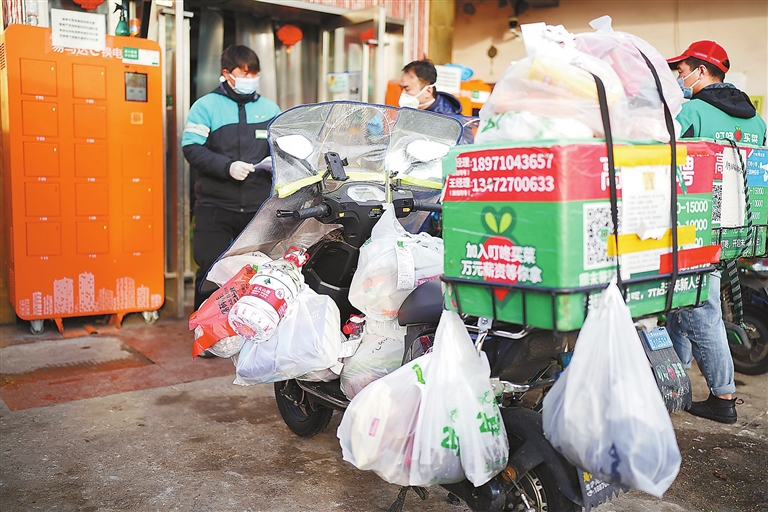
AN increasing number of e-commerce giants and food delivery platforms have joined in the battle against the resurgence of the Omicron variant in Shanghai to secure the megacity’s daily supplies. Local authorities confirmed Sunday that e-commerce giants such as JD.com, online food delivery platforms Meituan and Ele.me, and courier services companies have cooperated with the city to provide daily necessities for the residents. With a population of 25 million, Shanghai has now become a primary battleground against the virus. It reported 1,006 new locally transmitted infections and 23,937 asymptomatic carriers Sunday. The city has employed a temporary closed-off management strategy with citywide nucleic acid testing rounds. “I haven’t slept a wink for days,” said Cai Xiaobing, head of a branch of YTO Express, a major express delivery firm in China. Cai has become a community volunteer since April 4, providing food for residents in the neighborhood of his community. Cai’s wife organizes online group buying every morning, and Cai contacts sellers and arranges the company’s drivers to distribute the goods to residents door-to-door. Cai said he needs to cope with goods for several thousands of residents every day. “I even drove to a community to deliver 150 kg of rice at around 2 a.m. And just now, 500 bags of flour sold out in merely two minutes,” he said, adding a volunteer team consisting of deliverymen has grown from six to 40, and they need to work more than 10 hours per day. Wang Wenbo, vice president of JD, said that JD is sourcing goods from nationwide to meet Shanghai citizens’ needs. The first batch of goods, including infant milk formula, diapers, medicines, epidemic prevention materials and mutton, have arrived. The company has also donated fresh produce including milk, meat and pastries worth 4 million yuan (US$628,700) to address the demand hikes in Shanghai. Some 16 million units of rice, flour and cooking oil are in stock to ensure daily supplies for a month, said Wang. Priority will be given to provide fresh produce as well as meat and seafood. The company will also replenish supplies of 80,000 infant and maternal items as well as 100,000 packages of drugs to meet the needs of patients with chronic illnesses, he added. JD has dispatched more than 2,000 anti-epidemic workers including delivery people to provide services in Shanghai. It will put into use “fifth-generation driverless vehicles” to accelerate deliveries and minimize physical contact, Wang said. Service platform Ele.me, which customers normally use for takeout deliveries, has dispatched an additional 2,800 couriers to Shanghai to expedite delivery, said the company’s Senior Vice-President Xiao Shuixian during a media briefing on the COVID situation Sunday. Xiao said the platform supports community-based group purchasing, covering 1,000 neighborhoods citywide, to meet bulk-buying demands, which also enhance efficiency of food deliveries. “We have seen completed daily orders more than double in the past several days,” Xiao said, adding that over 25,000 households have benefited from the service to obtain food necessities such as meat, eggs and dairy products. On Saturday, local authorities said Shanghai is to be subdivided into three zones based on the latest COVID test results and exposure risks: a precautionary zone, a controlled zone and a locked-down zone. Under the arrangement, Ele.me will devote more couriers to the locked-down and controlled zones to shore up delivery capacity. Improving the provision of daily necessities will be done in collaboration with restaurants, supermarkets and convenience stores that are authorized to resume business operations. In the past two days, Ele.me’s parent company, the Alibaba Group, has assembled 3,000 additional workers to sort and deliver products ordered online, aiming to address the spike in demand for food staples. Freshippo, Alibaba’s fresh produce retailer, said its emergency service channel has already served 5,300 communities, including nearly 800 neighborhoods undergoing prolonged lockdown. Supermarket chain RT-Mart has also raised its daily capacity of vegetables and fruit to over 1,000 metric tons in Shanghai. These are backed by logistics company Cainiao, which has transported around 2 million items between warehouses, stores and communities in the past several days. It has also delivered around 1,500 kilograms of vegetables to five nursing homes and 700 elderly people in neighborhoods. Dingdong Maicai, a Shanghai-headquartered platform that specializes in fresh produce, said it is looking to introduce an online queuing system. “The online queuing system is designed to prevent overcrowding during peak periods, thus streamlining transactions and potentially opening up more opportunities for those in need,” said Liang Changlin, founder and CEO of Dingdong Maicai. (Xinhua-China Daily) | 
